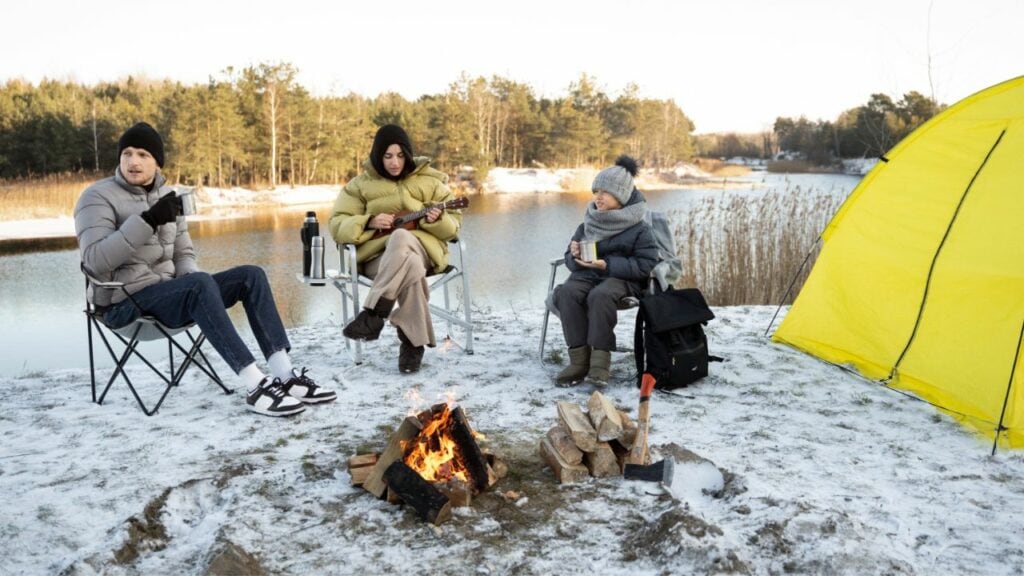We're an affiliate. We hope you love the products we recommend! Just so you know, we may collect a share of sales or other compensation from the links on this page. Thank you if you use our links, we really appreciate it!
Keeping your water from freezing while camping is essential, especially during the winter season. When you’re out in the wilderness, it’s crucial to have a steady supply of clean water to keep you hydrated and energized, but freezing temperatures can turn your water into ice, making it difficult to drink or use for cooking.
One of the simplest ways to keep your water from freezing is to insulate your water bottles. Insulating your water bottles is a practical and effective way to keep your water from turning into ice during cold camping trips. You can use insulating sleeves or covers specifically designed for water bottles.
Another option is to wrap your water bottles in a layer of clothing or a towel to provide extra insulation. This will help keep your water at a drinkable temperature for a longer period.
Along with insulation, a simple way to keep your water from freezing is to keep it close to your body. When you’re hiking or camping, your body generates heat, which can be used to keep your water from freezing. You can still keep your water bottles in your backpack, but make sure to keep them on the inside nearest your body to take advantage of your body heat.
Though it might sound crazy, one last way to keep your water bottle from freezing while winter camping is to bury it in the snow. Wondering how that works exactly? It’s a marvel of science we’ll get into more deeply below.
Preventing Water from Freezing
When you’re camping in cold weather, keeping your water from freezing is essential. Here are a few tips to help you prevent your water from freezing while camping:
- Insulate your water bottles: One of the easiest ways to keep your water from freezing is to insulate your water bottles. You can use insulated sleeves or wrap your water bottles in a layer of clothing to keep them warm. This will help them retain heat and prevent the water inside from freezing.
- Keep your water bottles close to your body: Another way to keep your water from freezing is to store them next to you, such as inside your sleeping bag. Your body heat will help keep the water bottles warm, preventing them from freezing.
- Use a hot water bottle: Before you go to bed, fill a heat-resistant water bottle with hot water and place it next to your water bottles. The heat will radiate and keep the surrounding area warmer, preventing the water from freezing.
- Bury the water bottle: If you’re camping in snow, you can bury your water bottle in the snow. While snow might be cold, it’s often not as cold as the surrounding air, and can act as insulation, helping to keep the water from freezing.
- Turn your water bottle upside down: When you’re storing your water bottles, turn them upside down. This will prevent the water from freezing at the top of the bottle, making it easier to access the water when you need it, even if part of it does freeze.
- Add salt to the water: Adding a small amount of salt to your water can help lower the freezing point of the water. Just be careful not to add too much salt, as it can make the water unpalatable.
Container Choices and Care
When it comes to keeping your water from freezing while camping, the type of container you use can make a big difference. Wide-mouth bottles are the best option because they are easier to fill and clean, and allow you to add ice cubes or hot water if needed. Look for bottles made of durable materials like stainless steel or plastic.
In addition to choosing the right container, it’s important to take care of it properly. Before you head out on your camping trip, make sure your water containers are clean and dry. This will help prevent bacterial growth and keep your water tasting fresh. If you’re using fabric bottle insulators, be sure to clean those regularly as well to prevent germ transmission.
Insulated Water Bottles
Insulated water bottles or containers are a great choice for winter camping because they can keep your water at a non-freezing temperature for a longer period. If you don’t have an insulated container, you can wrap your water bottles or hydration bladders in insulating materials like bubble wrap or foam to help prevent freezing.
When storing your water containers, keep them in a thermal cooler at night to help maintain their temperature. You can also store them in your sleeping bag to take advantage of your body heat and keep them from freezing. If you are camping in extremely cold temps, you will definitely need an insulated water bottle to keep your water from freezing.
Handling Frozen Water

When camping in the coldest weather, it’s not uncommon to wake up to find your water frozen solid. While it’s not ideal, and can be a little worrisome for a minute, there are still a few things you can do to handle frozen water.
First, don’t try to force open a frozen water container. This can damage the container and potentially cause injury. Instead, you need to find a way to let the container thaw naturally. Start by placing it in a warmer area, such as inside your sleeping bag, to speed up the process.
If you have access to a fire, this is a great source for thawing a frozen water bottle. Place your frozen water container near the fire and wait. Just be sure to keep an eye on it and remove it once it’s thawed to prevent it from getting too hot and potentially melting.
Prevention
While there are things you can do to recover water from a frozen water bottle while camping, prevention is the much better option. Be sure to insulate your water containers and keep them in a thermal cooler at night to prevent them from freezing in the first place.
Frequently Asked Questions
How can I prevent my 5 gallon water jug from freezing while camping?
Insulating your water container is the best way to prevent it from freezing. You can wrap your water jug in an insulating material like foam or bubble wrap to help keep it warm. Another option is to place the jug in a cooler with some insulating material like a blanket or sleeping bag.
What items can I add to water to keep it from freezing while camping?
Adding salt or sugar to your water can lower its freezing point, but it will also affect the taste. A better option is to add an antifreeze solution made specifically for drinking water. Just be sure to follow the instructions carefully and not exceed the recommended amount.
What are some cold weather backpacking gear options to keep water from freezing?
Investing in a good quality insulated water bottle or hydration system is a great way to keep your water from freezing. A camp stove to melt snow or ice for drinking water is a good back-up option in extremely cold weather conditions.
Remember, staying hydrated is crucial for your health and safety while camping in cold weather. By taking the necessary precautions and using the right gear, you can keep your water from freezing and ensure you have access to clean drinking water throughout your trip.

We’re passionate about getting the most from your car when it comes to going on adventures and road trips. When you take one of these trips you often need more room in your car than you usually would. This is when we come in, to help you find the best roof tent for your car and needs.

